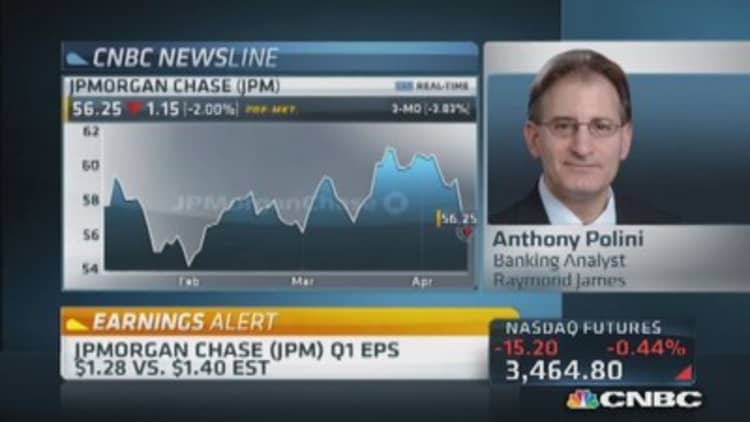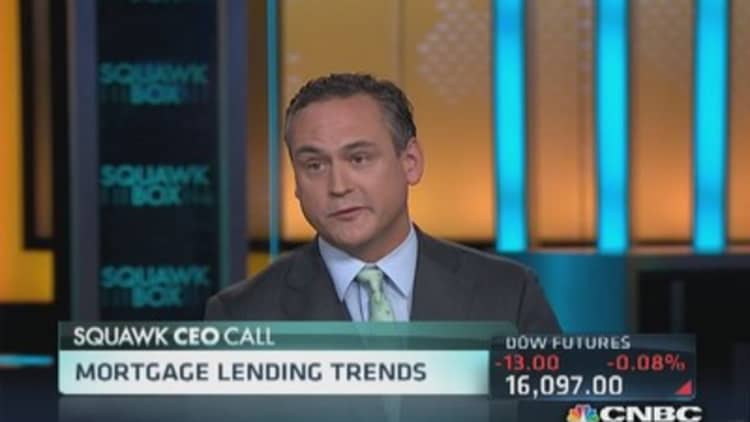
JPMorgan Chase reported a far weaker-than-expected quarterly profit as revenue from securities trading fell in a climate of uncertainty about the strength of the economic recovery and the Federal Reserve's intentions on interest rates.
Net income fell to $5.27 billion, or $1.28 per share, from $6.53 billion, or $1.59 per share, in the same quarter of 2013, the biggest U.S. bank said on Friday.
Analysts on average had expected earnings of $1.40 per share, according to Thomson Reuters I/B/E/S. The net earnings for both the latest and prior quarters included special items.
Read MoreFeds in Manhattan investigate JPMorgan's Masters
Total net revenue fell 8.5 percent to $22.99 billion, falling well short of the average estimate of $24.53 billion.
JPMorgan's shares, which recently topped $61 to trade at their highest level in 13 years, were down 3.3 percent at $55.50 in premarket trading. (Click here to get the latest quotes.)
Chief Executive Jamie Dimon struck an upbeat note, however.
"We have growing confidence in the economy—consumers, corporations and middle market companies are in increasingly good financial shape and housing has turned the corner in most markets...," he said in a statement.
Dimon has been pushing to improve the bank's profitability after net income dropped 16 percent last year due to massive legal settlements and rising costs to improve compliance with laws and regulations.
JPMorgan's revenue from fixed-income fell 21 percent to $3.8 billion in the quarter ended March 31, while revenue from equity markets fell 3 percent to $1.3 billion.
Read More Wells Fargo profit rises 14% as costs fall
Some investors worry about how much of the big banks' revenue streams from fixed-income trading have been lost forever as a result of changes ordered by regulators to make the banking system safer. JPMorgan's annual costs to comply with laws and regulations and control risk have increased by about $2 billion.
JPMorgan, the first big investment bank to report for the quarter, said non-interest expenses fell 5 percent in the latest quarter to $14.6 billion.
Mortgage lending falls
Dimon is aiming to hold down overhead - which he defines as non-interest expenses aside from litigation - to below an average of $14.75 billion per quarter, or $59 billion for the year.
Mortgage banking net income fell to $114 million in the quarter, a drop of $559 million from the year-earlier period.
The bank's mortgage originations fell 68 percent to $17 billion from a year earlier, and were down 27 percent from the fourth quarter.
U.S. mortgage lending has been cooling as homeowners finish refinancing their loans.
JPMorgan, the largest U.S. bank by assets, said total assets at the end of March stood at $2.48 trillion, up from $2.42 trillion at the end of December.
The firm's supplementary leverage ratio, a measure of a bank's capital compared with its assets, stood at 5.1 percent at the end of the quarter.
Leverage ratios took on added importance on Tuesday when the Federal Reserve approved new rules setting minimum levels that could force the eight biggest U.S. banks to boost their capital by a total of $68 billion.
The rule sets a higher minimum of 6 percent for the company's insured bank subsidiary.
Before the rule was approved in its latest form, JPMorgan had said it was on track to raise its ratio from 4.6 percent at the end of December to the 5 percent minimum for its holding company by the end of this year.
Litigation expenses 'immaterial'
JPMorgan said its litigation expenses were immaterial in the latest quarter, under its "other corporate" accounting line.
Litigation expenses totaled $347 million in the year-earlier quarter and $847 million in the fourth-quarter.
In the first quarter two years ago, litigation costs totaled$2.5 billion as the bank built up reserves in anticipation of big legal settlements that it ultimately reached in 2013.
Read More Consumer, telecom stocks may lead earnings growth
JPMorgan paid more than $20 billion last year to resolve legal claims stemming from range faults, including its London Whale derivatives loss and its marketing of bad mortgage securities before the financial crisis.
The rise in compliance costs is a hurdle to Dimon's goal of bringing down overhead to below $59 billion from $60 billion in 2013.

JPMorgan recently trimmed its key average profitability target—return on tangible common equity—to a range of 15 to 16 percent, from 16 percent.
The target cut mainly reflects pressure on profit margins in the bank's investment and commercial banking operations because of new regulations and heightened competition.
Margins from credit cards have also been shrinking as customers become less inclined to carry balances.
Revenue from retail banking, which includes income from the bank's credit card operations, fell 10 percent to $10.46 billion.
Results from JPMorgan's big retail banking and credit card operations are considered a pointer to reports due in coming weeks from regional banks and card issuers.
JPMorgan's shares—which have nearly doubled in price since the bank was rocked in 2012 by its London Whale derivatives trading scandal and $6.2 billion loss—were trading at a multiple of 9.56 times estimated forward earnings on Thursday.
—By Reuters

